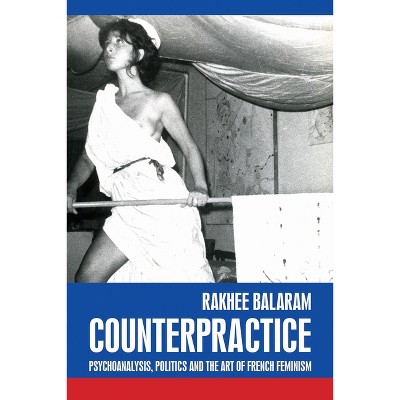Sponsored

Productive Failure - (Rethinking Art's Histories) by Alpesh Kantilal Patel (Paperback)
$36.49Save $1.46 (4% off)
In Stock
Eligible for registries and wish lists
Sponsored
About this item
Highlights
- This title sets out to write new transnational South Asian art histories - to make visible histories of artworks that remain marginalised within the discipline of art history.
- About the Author: Alpesh Kantilal Patel is Associate Professor of Contemporary Art and Theory at Florida International University, Miami
- 272 Pages
- Art, Asian
- Series Name: Rethinking Art's Histories
Description
About the Book
This monograph provides novel methods for writing transnational South Asian art history outside of genealogy.Book Synopsis
This title sets out to write new transnational South Asian art histories - to make visible histories of artworks that remain marginalised within the discipline of art history. However, this is done through a deliberate 'productive failure' - specifically, by not upholding the strictly genealogical approach that is regularly assumed for South Asian art histories. For instance, one chapter explores the abstract work of Cy Twombly and Natvar Bhavsar. The author examines 'whiteness', the invisible ground upon which racialized art histories often pivot, as a fraught yet productive site for writing art history. This book also provides original commentary on how queer theory can deconstruct and provide new approaches for writing art history. Overall, this title provides methods for generating art history that acknowledge the complex web of factors within which art history is produced and the different forms of knowledge-production we might count as art history.From the Back Cover
This book sets out to write new transnational South Asian art histories, making visible the histories of artworks that have been marginalized within the discipline. It does this through a deliberate 'productive failure' - rejecting the dominant genealogical methodology in favour of a more active, performative approach.
To investigate what this means for how we 'do' art history, the book considers an array of conventional frames - authorship, subject matter, form - but only as points of departure for exploring artworks and the broader visual culture. It also examines 'whiteness', the invisible ground upon which racialized art histories often pivot, as a fraught yet productive site for writing art history. In effect, the book queers or destabilizes conventional approaches to writing South Asian art histories. It then proceeds to explore alternative forms of art-historical 'writing' autoethnographic narratives relating experiential knowledge of space, curatorial knowledge-making via exhibitions organized by the author, and affective encounters with visual culture. This queering offers a more sited, nuanced and encompassing method for generating art history, one that acknowledges the complex web of factors within which art and its history are produced, as well as the different forms of knowledge-production that can be counted as art history.Review Quotes
'...advances an original, rigorously self-reflexive, and provocative argument for the formulation of a New South Asian Art History conceived through the lens of queer theory and queer subjectivities.'
Margo Machida, Professor Emerita, University of Connecticut
Jonathan D. Katz, Associate Professor, University at Buffalo, SUNY 'Patel is a person through whose eyes one learns to see anew with one's own.'
Donald Preziosi, Distinguished Research Professor and Professor Emeritus, University of California, Los Angeles 'In his provocative engagement with queer subjectivities, Patel's intervention does not only create new potentialities for the study of South Asian Art, but he also proposes an urgently needed reimagining of art historical methodology.'
Derek Conrad Murray, Associate Professor of Modern and Contemporary Art, University of California, Santa Cruz 'Patel's project calls attention to neglected histories, while simultaneously dismantling the processes of circumscribing identity-based discourses via axiomatic, geographic, and appearance-based methods of determining belonging. At the heart of the book is a desire to call attention to how we each exist in a mobile, intersectional zone at the crux of various identity categories and ideologies. Throughout the text, Patel demonstrates how imperative it is for scholars to articulate our situatedness, not only for the sake of transparency, but because it enriches cross-cultural, interdisciplinary exchange and highlights issues around cultural translation. Patel's reworking of the discursive framing of canon formation is a significant intervention not only within South Asian art, but also for art history, visual studies, and conceptions of identity more broadly. Patel's commitment to transparent, intersectional, hybrid, adaptable, self-reflexive, and critically engaged methods models much-needed interventions into art history, visual studies, and discourses of identity.'
Ace Lehner, Art Journal (Winter 2018) 'Alpesh Kantilal Patel's Productive Failure: Writing Queer Transnational South Asian Art Histories is a valuable contribution to this growing body of literature that attempts to expand the parameters of art history and its constituent subfields, employing "affirmative criticality" and "productive failure" as methods to produce a more ethical, entangled, and transparent practice of writing (art) history.'
CAA Reviews 'The book reads not only as a strong collection of unwritten narratives, but also as a critique of art history's exclusion and tokenization of artists of South Asian descent. The organization of the book prepares the audience with theories to rethink their own understanding of the production of art histories. One of the strengths of the book is the intimacy of the narration. Patel is aware of the limited reach of his academic language and makes challenging theoretical discussions accessible through his use of tone, through which readers can feel as if they were having a casual conversation with a close friend.'
Asian Diasporic Visual Cultures and the Americas
About the Author
Alpesh Kantilal Patel is Associate Professor of Contemporary Art and Theory at Florida International University, MiamiDimensions (Overall): 9.13 Inches (H) x 6.14 Inches (W) x .63 Inches (D)
Weight: 1.35 Pounds
Suggested Age: 22 Years and Up
Number of Pages: 272
Series Title: Rethinking Art's Histories
Genre: Art
Sub-Genre: Asian
Publisher: Manchester University Press
Theme: General
Format: Paperback
Author: Alpesh Kantilal Patel
Language: English
Street Date: June 7, 2018
TCIN: 91573267
UPC: 9781526132529
Item Number (DPCI): 247-34-5482
Origin: Made in the USA or Imported
If the item details aren’t accurate or complete, we want to know about it.
Shipping details
Estimated ship dimensions: 0.63 inches length x 6.14 inches width x 9.13 inches height
Estimated ship weight: 1.35 pounds
We regret that this item cannot be shipped to PO Boxes.
This item cannot be shipped to the following locations: American Samoa (see also separate entry under AS), Guam (see also separate entry under GU), Northern Mariana Islands, Puerto Rico (see also separate entry under PR), United States Minor Outlying Islands, Virgin Islands, U.S., APO/FPO
Return details
This item can be returned to any Target store or Target.com.
This item must be returned within 90 days of the date it was purchased in store, shipped, delivered by a Shipt shopper, or made ready for pickup.
See the return policy for complete information.

















